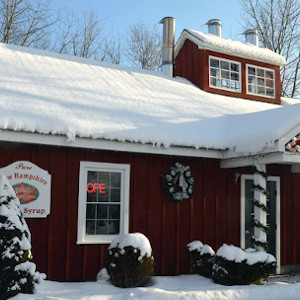
Sugaring comes early in a person’s life, if it is going to come at all. For Dave Fuller, he was a young teen when he was introduced to the mystery of tapping the sugar maple for its sweet sap. Now, sugaring is what he does. He taps the trees; he boils the syrup, and packages it. No mystery here; sugaring and the business of maple syrup is his full time passion.
In January, Dave and his son, James, begin repairing their snow buried tubing for the coming season. Because the earliest sap is usually the sweetest, they want to be ready and sap appears in mysterious ways; one never knows when the daytime temperature will climb high enough for the sap to begin flowing. Forty degrees is about the temperature they are looking for. In the North Country, it can be as early as late February. The family taps over 9,500 maple trees in the Lancaster area and boils down over 160,000 gallons of maple sap to produce over 4,000 gallons of maple syrup. End of the season syrup is dark and is considered commercial grade. Mrs. Fuller, who makes the maple candy and sugar and runs the family store in Lancaster prefers it for cooking because of its intense sweetness and flavor.
By Helen Brody (March 3, 2014)
“Carpentry is my joy, sugaring is my passion.” Dave Fuller
Sugaring comes early in a person’s life, if it is going to come at all. For Dave Fuller, he was a young teen when he was introduced to the mystery of tapping the sugar maple for its sweet sap and though he took up carpentry as a career, the old passion kept beckoning him back and in 2002, the Siren song was irresistible. Now, sugaring is what he does. He taps the trees; he boils the syrup, and packages it. No mystery here; sugaring and the business of maple syrup is his full time passion.
In January, Dave and his son, James, begin repairing their snow buried tubing for the coming season. While working in their North Country woods, the Fullers prefer a light snow cover so they can see the lines and do not have to dig down too deep to locate them. The lines carry the sap from their rock and sugar maples to a waiting tank to be trucked to the sugarhouse. Eighty to ninety percent of commercial sugarers in the state are using tubing, not only because it is more efficient, but also because concern has developed in recent years that the old metal buckets, as colorful as they were, may have been leaching impurities into the syrup. Animal tracks are the clue to damage under the snow cover. During the winter months New Hampshire’s wild life work their mischief. Moose trip over the lines, squirrels, porcupines, chipmunks, and mice chew them, even an occasional bear is known to have taken a chunk. But man, ever resourceful, has developed a new type of tubing with small particles of aluminum blended into the molten plastic to discourage the creatures of the woods. Because the earliest sap is usually the sweetest, they want to be ready and sap appears in mysterious ways; one never knows when the daytime temperature will climb high enough for the sap to begin flowing. Forty degrees is about the temperature they are looking for. In the North Country, it can be as early as late February. They family presently tap 9,500 maple trees in the Lancaster area and boil down over 160,000 gallons of maple sap to produce over 4,000 gallons of maple syrup. End of the season syrup is dark and is considered commercial grade. Mrs. Fuller, who makes the maple candy and sugar and runs the family store in Lancaster prefers it for cooking because of its intense sweetness and flavor.
The Fullers have a reputation to uphold. They won the North American award for Best of Show for their light amber syrup in 2002 as well as first place awards for their maple cream and maple candy. Since maple syrup is specific to North America and Canada, they are the holders of world titles.
Dave and Patti Fuller
267 Main St.
Lancaster, NH 03584
http://www.fullerssugarhouse.com
603-788-2719
primary products: maple syrup, maple syrup products, syrup making equipment point of sale: on-site store
wholesale and retail
Article adapted from: New Hampshire: From Farm to Kitchen
